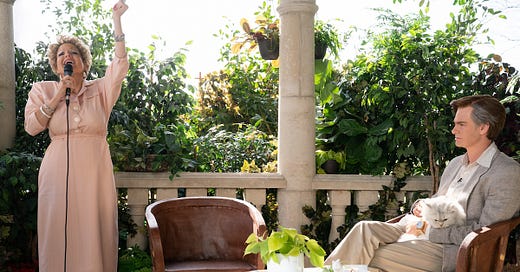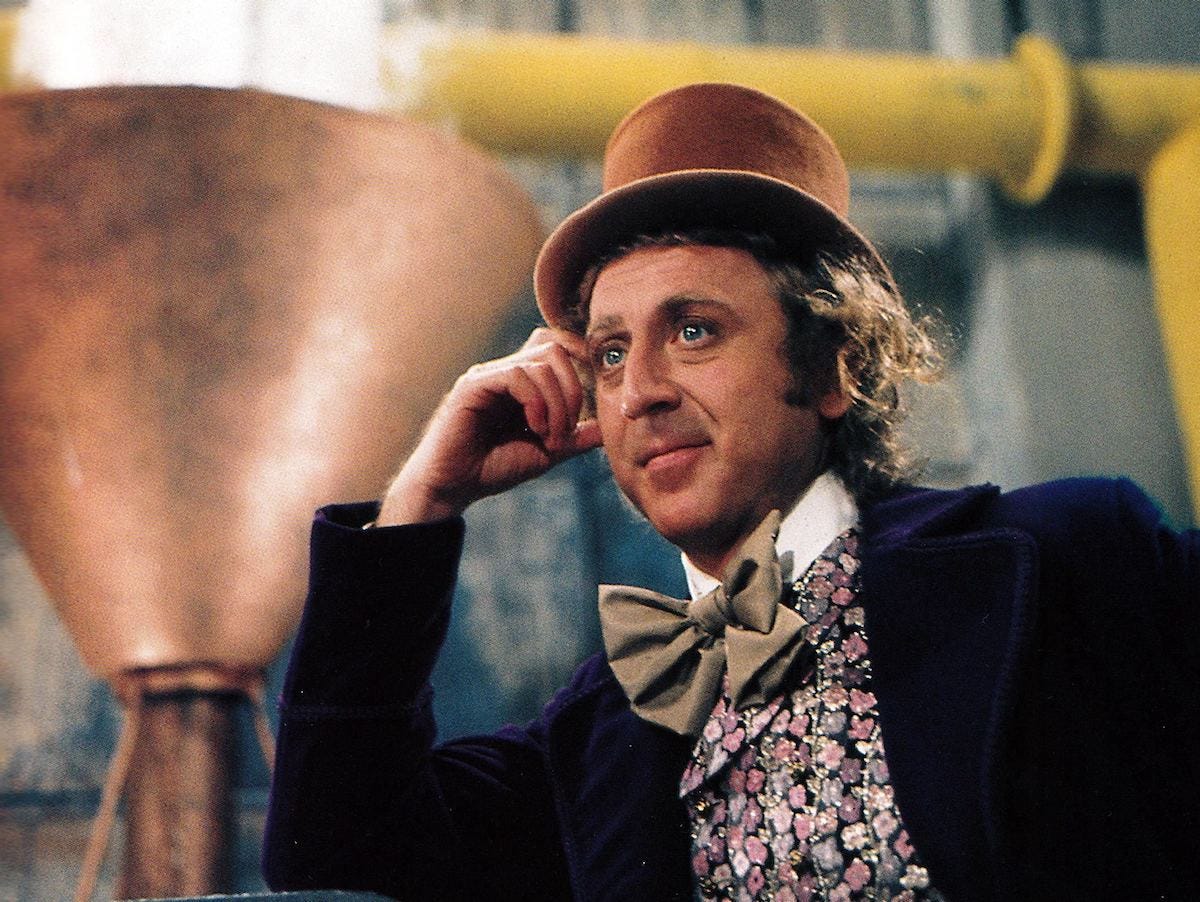'The Eyes of Tammy Faye' Review
Plus: Roald Dahl's been dead for 30 years. How long should his estate continue to profit?
The Eyes of Tammy Faye Review
A big reason why The Eyes of Tammy Faye doesn’t work, at least for me, is that it feels as though it’s structured like a biopic about a musician and all biopics about musicians have been rendered virtually unwatchable by Walk Hard: The Dewey Cox Story.
If you’ve never seen Walk Hard you should, because once you see it you’ll never be able to un-see its deconstruction of the tropes of the biopic, particularly the biopic about a musical figure. The arc goes something like this: hardscrabble childhood leads to the development of talent, which in turn leads to being noticed and gaining success, which invariably results in drug abuse and addiction, before a final comeback restating the greatness of the performer in question.
So let it be written, so let it be done: The Eyes of Tammy Faye highlights the hardscrabble youth of one Tammy Faye and her mother’s distance, given that she’s the daughter of a previous marriage. It shows how Tammy Faye, played by Jessica Chastain, grew to fame and fortune as the wife of prosperity-gospel preacher Jim Bakker (Andrew Garfield), taking their show first on the road and then onto TV as part of Pat Robertson’s (Gabriel Olds) Christian channel.
Finding success but feeling stifled by Robertson, the Bakkers struck out on their own, buying a satellite uplink that put them in over 20 million homes around the world. A hugely popular television network, a series of best-selling albums, even a theme park at one point: the Bakkers had it all! But then temptation (in the form of Nashville producer Gary Paxton (Mark Wystrach)) and drugs (in the form of Ativan) derailed Tammy Faye’s life, as greed and embezzlement and sex with a church secretary ruined Jim’s. The bigger they are, the harder they fall, and the fall of the House of Bakker was hard indeed: prison, mockery, and, eventually, for Tammy Faye, redemption of a sort.
The whole thing is so formulaic that it almost feels like parody (that is, it almost feels like Walk Hard), and director Michael Showalter undoubtedly has a sardonic streak in him: the closing number, intercutting Tammy Faye’s religiously inflected music with red, white, and blue Americana, is a bit on the nose. But I don’t think it’s intended as parody, at least not entirely. It often feels too genuine and heartfelt, an effort to rehabilitate a woman who, in addition to helping her husband bilk millions of parishioners out of hundreds of millions of dollars, became a camp icon in part for her decision to treat AIDS patients with decency in an era when such decency was hard to come by.
Chastain brings real theater-kid energy to the performance, and I mean that in the nicest way possible: She’s trying her hardest to sell this thing and really commits to the bit. There isn’t a moment in this movie where I don’t believe she’s selling the idea of Tammy Faye as Tammy Faye herself understood the idea of Tammy Faye, and there’s something to that. She’s a swirl of energy throughout. Same with Andrew Garfield, who is all exaggerated features and conniving manipulation.
But a couple of strong performances aren’t really enough to save The Eyes of Tammy Faye, which feels both padded at its two-hour-plus running time and underdeveloped. I left this picture without a much better sense of why Tammy Faye did what she did outside of some dime-store psychologizing about an unhappy childhood. A tighter focus on either her complicity in Jim’s financial malfeasance or her decision to push back against the church’s treatment of gay AIDS patients would’ve given this movie a clearer reason for being.
Hey, if you like this newsletter you probably dig my podcast Across the Movie Aisle. And if you dig Across the Movie Aisle and want to a.) get it sent to your preferred player of choice the day it drops rather than the next day while also b.) unlocking the special bonus episode each week, you should sign up for the free 30-day trial of Bulwark+. You’ll also open up the comments to this here newsletter and you’ll get access to the Thursday Night Bulwark livestream, JVL’s and Charlie’s newsletters, and a whole bunch of great podcasts. Sign up now and help keep this newsletter sustainable!
Netflix Buys Roald Dahl’s Catalog. Should It Even Be for Sale?
One of the big stories this week was that Netflix is dropping half-a-billion pounds—roughly $686 million, depending on the exchange rate—for the rights to adapt all of Roald Dahl’s work.
The deal somewhat calls to mind the arrangement between Eon Productions and MGM with regard to James Bond in that the Roald Dahl Story Co. will retain some measure of creative control while Netflix puts up the money.
“The deal announced [Wednesday] leaves much of the creative control with the RSCD, calling for its team to ‘stay in place, operating as an autonomous unit within Netflix.’ In addition, proceeds from the sale will set up a charitable trust that will ‘focus on supporting existing and new charity partners in the areas of children's health, anti-hate and anti-racism,’” NPR’s Elizabeth Blair reports.
The last part is a bit amusing, given what we know of Netflix’s desire to appear to be a progressive force in the world of entertainment and Roald Dahl’s, um, baggage. As someone who grew up reading the twisted mind behind childhood villains like The Twits and childhood … well, not heroes, maybe, but figures of whimsy like Willy Wonka and the Big Friendly Giant, I hope Dahl’s creations are in good hands. (Or, rather, in good hands again, given that we’ve had numerous adaptations of virtually every adaptable Dahl property already by genuine talents with names like Spielberg and Zemeckis and Roeg and Burton.)
On the other hand, as someone who has grown increasingly skeptical about the length of copyright terms, I have to ask whether they should be for sale at all.
Look, I’m a copyright hawk in a certain regard: If you make something you should get paid for it. If the price you put on it is so high that some people don’t want to pay it, those people have no right to your work. Piracy is abhorrent and people who engage in it should, in my humble and not terribly popular opinion, be punished criminally. Our prisons are dangerously undercrowded at the moment anyway.
Which is to say that I think of copyright as a moral right as opposed to a tool designed solely to increase productivity. But it’s a right that should expire after a certain amount of time, either at the time of the author’s death or the date of a work’s publication plus 12 years, whichever is longer. Dahl died more than 30 years ago; some of his most popular works were written 30 years before that. It is not abundantly clear why a book published in 1961, as James and the Giant Peach was, should remain under copyright until 2060, as it will under current copyright law. The person who performed the labor is long since deceased and limiting who can make movies with the material does nothing to boost creativity—indeed, it (actively and intentionally) restricts the number of people who can interact with the work creatively.
In a sense, this is a minor problem; I don’t suppose it really matters if Matilda is kept out of the hands of the general public’s ability to adapt. And given the problems of rampant piracy in the book and film industry, maybe it’s not the most important intellectual property battle out there. But it’s something that’s going to become more and more of an issue as films, books, and other materials slip out of the public view and into a space where they’re not worth reproducing and, therefore, not worth the copyright holder making available.
Assigned Viewing: Sweet Sweetback’s Baadasssss Song (Alamo On Demand)
Melvin Van Peebles died this week at the age of 89; the director’s career spanned decades, genres, and art forms, but he is probably best known as one of the early progenitors of blaxploitation. He lived a fascinating life—among other things, he served in the Air Force as the navigator on B-47 bombers—and one well worth remembering; I can’t recommend this New York Times obituary enough.
But it’s the movies we remember most, and Sweet Sweetback’s Baadasssss Song perhaps most of all. Famously rated X upon release—a rating he protested and then used to his advantage in advertisements, saying it was an unfair and racist designation handed down by “an all-white jury”—the movie is rough-hewn and just plain rough, rife with striking violence and rather explicit sex scenes. Celebrate the life of this pioneer by checking out the Alamo Drafthouse’s VOD presentation of Vinegar Syndrome’s restored version of the film.








Wondering what your thoughts on Blue Bayou were? Was interesting, and, some spots flawed, but overall I enjoyed something different.